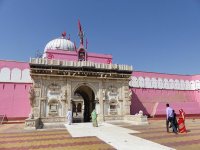The Karni Mata Temple, located in the town of Deshnok near Bikaner, Rajasthan, is one of the most fascinating and unique temples in India. Also known as the Rat Temple, it is dedicated to Karni Mata, a revered 14th-century saint considered an incarnation of Goddess Durga.
What makes the Karni Mata Temple extraordinary is its inhabitants—over 25,000 black rats, known as kabas, that roam freely within the temple. These rats are considered sacred and are believed to be the reincarnated souls of Karni Mata’s devotees. Spotting a white rat among the black ones is considered highly auspicious, as they are believed to be manifestations of Karni Mata herself or her close kin.
The temple’s architecture is equally mesmerizing. Built with stunning marble and stone, it features intricately carved silver gates and marble panels donated by the Maharaja of Bikaner. The main deity, Karni Mata, is enshrined in the temple's sanctum, with devotees offering prayers and food, much of which is shared with the rats.
According to legend, when Karni Mata’s stepson died, she petitioned Yama, the god of death, to restore his life. Yama granted her a boon that her devotees would be reincarnated as rats before being reborn as humans. This story underpins the temple's unique tradition and beliefs.
The Karni Mata Temple is especially vibrant during Navratri when thousands of devotees visit to seek blessings. Despite its unconventional setting, the temple exudes a deep sense of spirituality and devotion.
Visiting the Karni Mata Temple is an unforgettable experience, blending faith, folklore, and architectural beauty. It offers a glimpse into Rajasthan's rich traditions and the enduring legacy of Karni Mata’s divine influence.
What makes the Karni Mata Temple extraordinary is its inhabitants—over 25,000 black rats, known as kabas, that roam freely within the temple. These rats are considered sacred and are believed to be the reincarnated souls of Karni Mata’s devotees. Spotting a white rat among the black ones is considered highly auspicious, as they are believed to be manifestations of Karni Mata herself or her close kin.
The temple’s architecture is equally mesmerizing. Built with stunning marble and stone, it features intricately carved silver gates and marble panels donated by the Maharaja of Bikaner. The main deity, Karni Mata, is enshrined in the temple's sanctum, with devotees offering prayers and food, much of which is shared with the rats.
According to legend, when Karni Mata’s stepson died, she petitioned Yama, the god of death, to restore his life. Yama granted her a boon that her devotees would be reincarnated as rats before being reborn as humans. This story underpins the temple's unique tradition and beliefs.
The Karni Mata Temple is especially vibrant during Navratri when thousands of devotees visit to seek blessings. Despite its unconventional setting, the temple exudes a deep sense of spirituality and devotion.
Visiting the Karni Mata Temple is an unforgettable experience, blending faith, folklore, and architectural beauty. It offers a glimpse into Rajasthan's rich traditions and the enduring legacy of Karni Mata’s divine influence.

